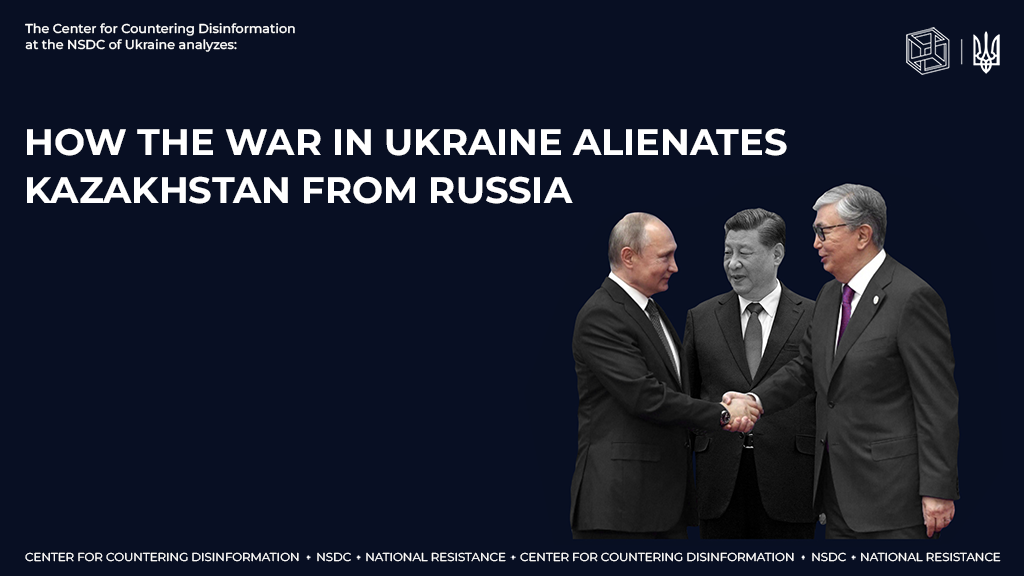Only a few days have passed since the defeat and flight of the russian army from the Kharkiv region, but events are unfolding one after another, indicating the loss of areas of influence that russia is used to maintaining.
As Minister of Foreign Affairs of Kazakhstan Mukhtar Tleuberdi reported, the agreements of Kazakh companies with the rf, which can potentially violate the sanctions regime, are under the control of the U.S. and EU authorities, who “conduct regular consultations”. In order to avoid the imposition of secondary sanctions, a governmental working group has been established in the country.
Due to the refusals of intermediaries in Kazakhstan, Kyrgyzstan and Armenia, russian companies face a shortage of equipment and components. Out of the $18 billion of lost monthly imports, the so-called allies of the kremlin in the post-Soviet space compensated only 2.4% (about $430 million per month).
The kremlin’s expectations to compensate for sanctions losses through “parallel imports” are also at risk of disruption. As a result of sanctions and trade blockades, supplies from abroad remained 35% lower than before the crisis as of the end of August. Due to “parallel imports”, russia managed to restore only 8% of the total pre-war imports to the country. Over the summer, stocks of equipment and components accumulated by importers from the EAEU countries were depleted.
The current situation in russia’s relations with Kazakhstan is very similar to Ukraine and is associated with the threat of military intervention in the country. Thus, putin’s propaganda actually supports the slogans of radical patriots in russia regarding the physical protection of ethnic russians and russia’s right to a part of “its territory” in northern Kazakhstan.
Although with the beginning of the russian invasion of Ukraine, the Kazakh authorities took an emphatically neutral position, the population did not remain indifferent. Solidarity actions with Ukrainians swept across the country, with the most large-scale ones occuring in Almaty. Despite the neutrality in speech, the Kazakh authorities have been providing humanitarian aid to Ukraine. One of the last known cases is a consignment of 13.6 tons for the residents in the Chernihiv region.
An indicative case was Tokayev’s statement at the economic forum in St. Petersburg, when he said in putin’s presence that Kazakhstan would not recognize the “quasi-state formations” in Donbas controlled by the kremlin. Moreover, Nur-Sultan demonstratively emphasizes the readiness to help Europe overcome the energy crisis in connection with the future shortage of russian energy resources. Since September, Kazakhstan’s oil has been partially exported bypassing russia through Azerbaijan.
Unsuccessful attempts to involve Kazakhstan in the war in Ukraine became an unexpected challenge for putin and only strengthened the decision of the republic’s leadership to further distance themselves from toxic Moscow in order not to become a “new Ukraine”. Therefore, for the sake of security, Kazakhstan’s leadership openly demonstrates their intention to get out of moscow’s “shadow” and readiness to seek another political and military ally in the Asian region.
Moreover, although the Kazakh Foreign Ministry denies the information on some social networks about Kazakhstan’s allegedly planned withdrawal from the CSTO on January 1, 2023, the actual actions of the Kazakh authorities indicate otherwise. Back in April, Chinese National Defense Minister Wei Fenghe held a meeting with Tokayev, where the parties agreed to strengthen military cooperation.
The gradual rapprochement with China was confirmed by the visit of Chinese leader Xi Jinping to Kazakhstan and his statement during his meeting with Kazakh President Tokayev, which confirmed China’s unequivocal position on supporting Kazakhstan’s independence, sovereignty and territorial integrity “no matter how the international situation changes” (a clear hint to the kremlin) and support in all regional and international issues. In addition, Kazakhstan seeks closer relations with Turkey. In early May, during a visit to Ankara, Tokayev signed an agreement on the assembly and maintenance of ANKA combat drones on the basis of Kazakhstan Engineering industry complex.
Thus, after the invasion of Ukraine, putin managed to lose almost all the advantages of foreign economic policy towards the post-Soviet republics that had been developed over decades. The situation is complicated for the kremlin by the resumption of hostilities between Armenia and Azerbaijan (backed by Turkey). Armenia has requested military assistance from the CSTO, and russia’s refusal to help will lead to Armenia’s withdrawal from the CSTO and the organization’s collapse. The provision of military assistance by other CSTO members will inevitably lead to the loss of russia’s influence within the organization and its role as a regional arbiter.
In such conditions, the importance of russia as a regional leader in Asia tends to drop to zero. Even its closest allies are ready to get out of control and become independent actors in the international arena.
In particular, Kazakhstan is confidently losing the status of a reliable political and military ally of the russian federation.
Analysts of the Center for Countering Disinformation at the NSDC have prepared a longread on the topic: Did putin really dismiss shoigu from commanding the “special operation” and why? Find more details at the link: cpd.gov.ua/main/prychyny-jmovirnogo-vidstoronennya/
# infoterror










